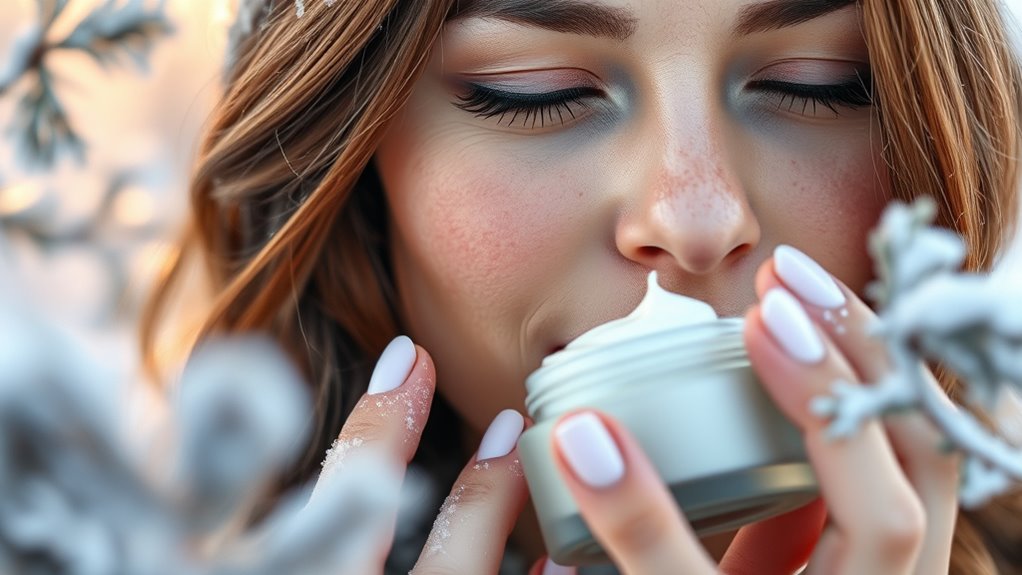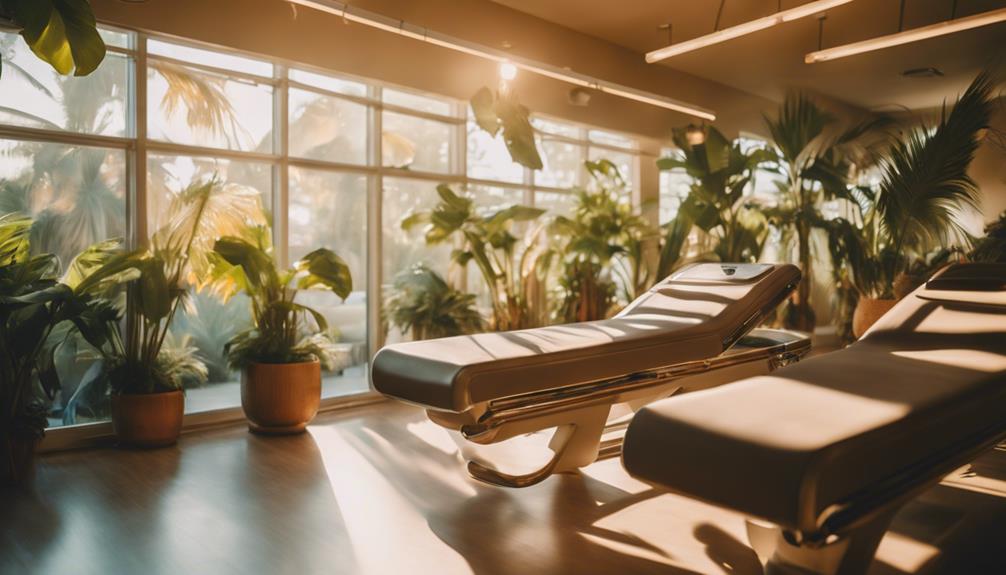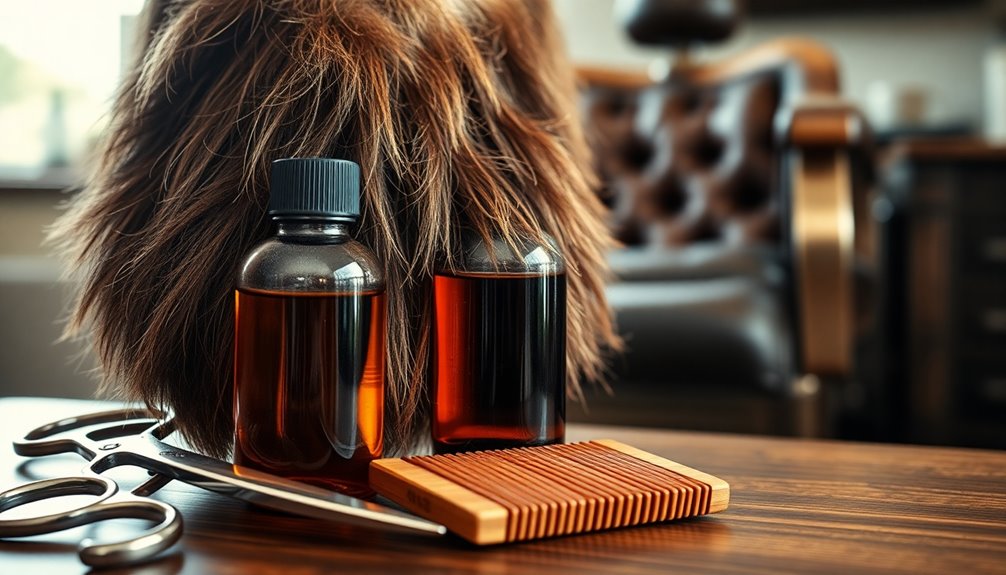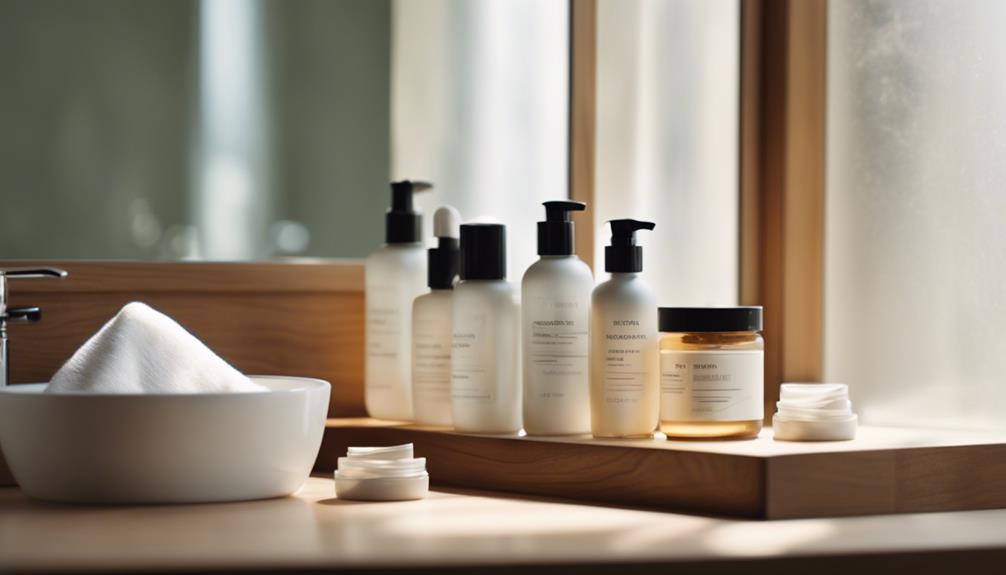To keep your skin hydrated in cold weather, use moisturizers with hyaluronic acid and glycerin to lock in moisture, and apply hydrating serums after your moisturizer. Protect your skin from harsh winds with scarves or barrier creams, and opt for gentle cleansers and lukewarm water. Consider using a humidifier indoors and avoid over-exfoliating. Following these tips will help your skin stay soft and resilient during winter’s chilly days. Discover more to maintain your glow all season long.
Key Takeaways
- Use hydrating ingredients like hyaluronic acid and glycerin in moisturizers to lock in moisture.
- Apply gentle, non-irritating cleansers and limit exfoliation to preserve the skin’s moisture barrier.
- Incorporate hydrating serums and barrier creams before outdoor exposure for added protection.
- Shield skin from cold winds with accessories such as scarves, gloves, and windproof outerwear.
- Use humidifiers indoors and stay hydrated to maintain optimal skin moisture levels during winter.
Understanding the Impact of Cold Weather on Skin

Cold weather can considerably affect your skin, often leading to dryness, irritation, and sensitivity. When temperatures drop, your skin loses moisture faster due to reduced humidity and indoor heating that strips away natural oils. This can cause your skin to become flaky, tight, and more prone to redness. The cold also constricts blood vessels, decreasing circulation and making your skin look dull. Wind exposure worsens these effects, aggravating irritation and potentially causing cracking or chapping. Additionally, you might notice increased sensitivity, as the skin barrier weakens and can’t shield against environmental aggressors. Understanding these impacts helps you recognize why your skin reacts differently during winter, prompting you to adapt your skincare routine to protect and maintain its health through colder months. Recognizing AI’s role in cybersecurity can also help protect your digital presence during this vulnerable season. Implementing skincare routines tailored for winter can significantly enhance your skin’s resilience and comfort. Being aware of skin barrier function is crucial, as it plays a vital role in defending against environmental damage and retaining moisture during harsh weather conditions. Developing a comprehensive understanding of hydration strategies can further support your efforts to maintain healthy, supple skin in cold weather. Incorporating moisturizers with occlusive ingredients can help seal in hydration and create a protective barrier on the skin’s surface.
Choosing the Right Hydrating Skincare Products
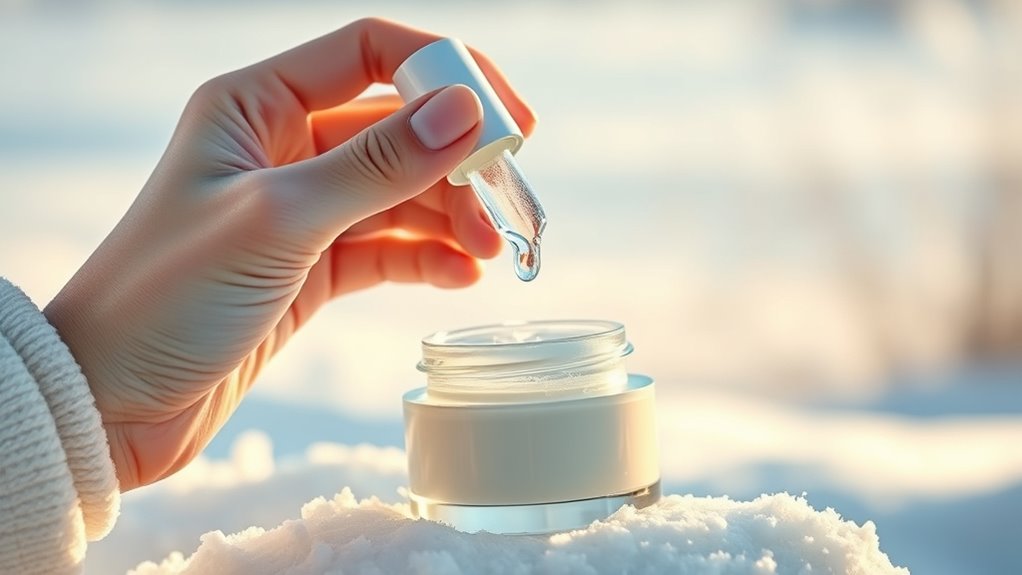
Choosing the right hydrating skincare products can make a big difference in winter. Look for moisturizer ingredients you can trust, like hyaluronic acid and glycerin, to keep your skin plump and moist. Opt for hydrating serums and non-irritating formulas that soothe sensitive skin and prevent dryness. Incorporating hydrating formulations suited for cold weather can further enhance your skin’s moisture barrier during winter months.
Moisturizer Ingredients To Trust
When selecting a moisturizer for winter, it’s vital to focus on ingredients that deliver real hydration without clogging pores or causing irritation. Look for humectants like hyaluronic acid, glycerin, and urea, which attract moisture to your skin. Emollients such as squalane, jojoba oil, and shea butter help lock in hydration and create a protective barrier. Occlusives like petrolatum and beeswax form a seal, preventing moisture loss in cold weather. Incorporate hydrating ingredients that are gentle yet effective to maintain skin suppleness. Using products with suitable formulations can maximize moisture retention and skin comfort. Including ingredients with a proven ability to attract water can further enhance hydration levels. Avoid harsh alcohols and fragrances that can irritate sensitive skin. Instead, choose products with soothing ingredients like ceramides and aloe vera. These ingredients strengthen your skin’s barrier and keep it hydrated, soft, and healthy despite the winter chill. Proper moisturizer ingredients can make a significant difference in maintaining skin health during winter. Always read labels to verify the formula suits your skin type.
Hydrating Serums for Skin
After selecting a moisturizer with effective hydrating ingredients, adding a serum can elevate your winter skincare routine by delivering an extra boost of moisture. Look for serums with hyaluronic acid, glycerin, or ceramides—they penetrate deeply and lock in hydration. Choosing the right serum depends on your skin’s needs, whether it’s plumping, soothing, or restoring moisture. When applied correctly, these lightweight formulas leave your skin feeling soft, resilient, and radiant despite the cold. To evoke emotion, consider how hydrated skin boosts confidence and comfort during chilly days:
| Feel More Confident | Embrace Softness | Stay Fresh & Radiant |
|---|---|---|
| Smooth, glowing skin | Comfort in dryness | Bright, lively look |
Additionally, incorporating skincare products with community support features can help maintain motivation and consistency in your routine. Hydrating serums with hydration ingredients are essential for combating winter dryness and keeping your skin healthy, especially when skin barrier function is compromised by cold weather. Maintaining proper skin barrier health can significantly improve hydration retention during winter months.
Choosing Non-Irritating Formulas
During winter, selecting hydrating skincare products that won’t irritate your skin is essential for maintaining comfort and health. Look for formulas labeled as hypoallergenic or suitable for sensitive skin. Avoid products with alcohol, fragrances, dyes, or harsh preservatives, as these can worsen dryness and cause irritation. Instead, choose gentle ingredients like ceramides, glycerin, hyaluronic acid, and oat extract, which soothe and strengthen the skin barrier. Incorporating gentle ingredients can help reduce the risk of irritation and improve skin resilience. Patch-test new products before full application to prevent adverse reactions. Opt for creams or lotions with a creamy, rich texture that lock in moisture without feeling heavy or greasy. Using appropriate skincare textures can enhance hydration without compromising comfort. Incorporating natural materials like linen and wood into your skincare routine can also help create a calming experience. Being mindful of skincare formulations that are suitable for sensitive skin can further protect against winter dryness. By choosing non-irritating formulas, you protect your skin from winter’s harsh effects and keep it hydrated, comfortable, and healthy throughout the season.
Incorporating Humidifiers Into Your Routine
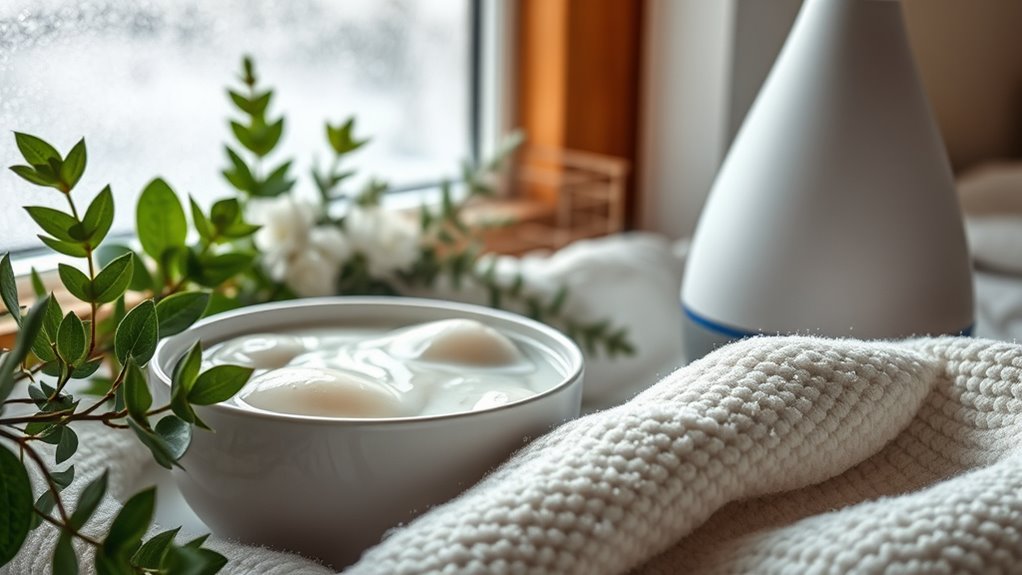
Adding a humidifier to your winter routine can markedly improve your skin and respiratory health. Cold, dry air strips moisture from your skin, leading to dryness and irritation. A humidifier adds moisture to the air, creating a more skin-friendly environment. To maximize benefits, place your humidifier in frequently used rooms and keep it clean to prevent mold and bacteria buildup. Adjust the humidity level to around 40-50% to avoid excess moisture, which can cause mold or dust mites. Using a humidifier can also ease breathing, reduce nasal congestion, and prevent dry throat. Keep a close eye on humidity levels, and refill the water regularly. Incorporating this simple device helps maintain skin hydration and promotes overall comfort during harsh winter months.
Tips for Gentle Cleansing and Exfoliation

Cleansing and exfoliating your skin gently is essential during winter to maintain its natural moisture barrier. Use a mild, hydrating cleanser that doesn’t strip away your skin’s oils. Avoid harsh scrubs and opt for soft, circular motions to cleanse without irritation. When exfoliating, choose a gentle chemical exfoliant with ingredients like AHAs or BHAs, or use a soft washcloth. Limit exfoliation to 1-2 times a week to prevent over-drying. Always follow with a hydrating toner or essence to replenish moisture. Use lukewarm water instead of hot, which can further dehydrate your skin. After cleansing and exfoliating, apply a rich moisturizer to lock in hydration. Incorporating moisture-retaining products can significantly enhance your winter skincare routine. Additionally, selecting gentle cleansing techniques minimizes the risk of disrupting your skin’s natural barrier. Regularly applying hydrating products can help restore and maintain your skin’s softness and resilience during the cold months. Consistency is key, and gentle care keeps your skin soft, smooth, and resilient through the cold months.
Protecting Skin From Harsh Winds and Cold Exposure

Harsh winter winds and cold temperatures can strip moisture from your skin and cause irritation if you’re not prepared. To protect yourself, start by wearing a thick scarf or face mask to shield your skin from direct exposure. Choose windproof and insulated outerwear to minimize cold contact. Additionally, apply a rich, barrier-forming moisturizer before heading outdoors to create a protective layer.
Shield your skin with scarves, insulated outerwear, and barrier creams during harsh winter winds.
Consider these key tips:
- Cover exposed skin with hats, scarves, and gloves
- Use products with occlusive ingredients like petrolatum or shea butter
- Limit time outdoors during extreme cold and wind
Maintaining a Nourishing and Moisturizing Routine

During winter, maintaining a nourishing and moisturizing routine is essential to keep your skin healthy and resilient. Use thick, hydrating creams that create a protective barrier against cold air. Incorporate ingredients like hyaluronic acid, glycerin, and natural oils to lock in moisture. Regularly apply a nourishing mask once or twice a week to boost hydration. Avoid hot water, which strips oils, and opt for lukewarm showers instead. To further enhance your routine, consider using humidifiers to maintain optimal indoor humidity levels that support skin hydration. Additionally, choosing products with antioxidants can help protect your skin from environmental stressors common in winter. Ensuring your skin receives adequate hydration from both topical products and internal sources can significantly improve its resilience against harsh weather conditions. Utilizing proper skincare tools can also aid in better absorption of moisturizers and enhance overall skin health during cold months.
Frequently Asked Questions
How Can Diet Influence Skin Hydration During Winter?
Your diet plays a vital role in maintaining skin hydration during winter. By eating foods rich in omega-3 fatty acids, like fish and flaxseed, you help strengthen your skin’s barrier and lock in moisture. Drinking plenty of water keeps your skin hydrated from within. Incorporate fruits and vegetables high in antioxidants to combat dryness and irritation. Avoid excessive caffeine and alcohol, which can dehydrate your skin further.
Are There Specific Ingredients to Avoid in Winter Skincare?
Like a modern-day Marie Antoinette, you might think everything is fair game, but some ingredients can sabotage your winter skincare. Avoid alcohol-based products, as they dry out your skin, and steer clear of harsh fragrances that can cause irritation. Also, stay away from heavy, pore-clogging oils. Instead, opt for hydrating ingredients like hyaluronic acid and glycerin. These will help keep your skin plump and moisturized despite the cold.
Can Winter Skincare Routines Differ for Sensitive Skin?
Absolutely, your winter skincare routine should adapt if you have sensitive skin. You need to choose gentle, fragrance-free products that soothe rather than irritate. Look for ingredients like ceramides and hyaluronic acid to boost hydration without causing redness or irritation. Avoid harsh exfoliants and alcohol-based products, and always patch-test new items. This tailored approach helps protect your sensitive skin from harsh winter elements while maintaining comfort and hydration.
How Often Should I Replace My Skincare Products in Winter?
You should replace your skincare products every 6 to 12 months, especially in winter. Cold weather can cause products to degrade faster, losing their effectiveness. Check for changes in texture, smell, or color, and discard anything that seems off. Using fresh products guarantees you get maximum benefits and avoid potential skin irritations. Regularly updating your skincare routine helps your skin stay healthy, hydrated, and protected throughout the chilly season.
Are There Natural Remedies to Boost Winter Skin Hydration?
Imagine a dewy forest after rain—fresh and revitalized. Natural remedies like honey, aloe vera, and coconut oil can boost your winter skin hydration. You can apply honey as a mask, use aloe vera gel for soothing moisture, or massage coconut oil into dry areas. These remedies nurture your skin gently, providing deep hydration and a natural glow, just like the refreshed forest after a gentle rain.
Conclusion
Just like a delicate flower needs protection from harsh weather, your skin requires extra care in winter. Think of your skincare routine as a shield—hydrating, nourishing, and guarding against the cold’s assault. I once forgot my moisturizer on a chilly trip, and my skin quickly dried out, reminding me how crucial this shield truly is. Keep your skin well-hydrated and protected, and you’ll stay glowing all season long. After all, your skin’s health is worth the effort.
